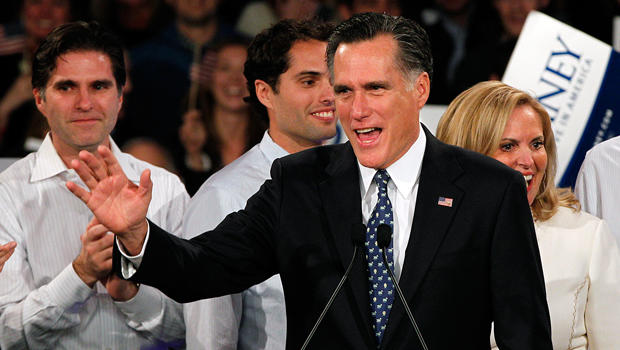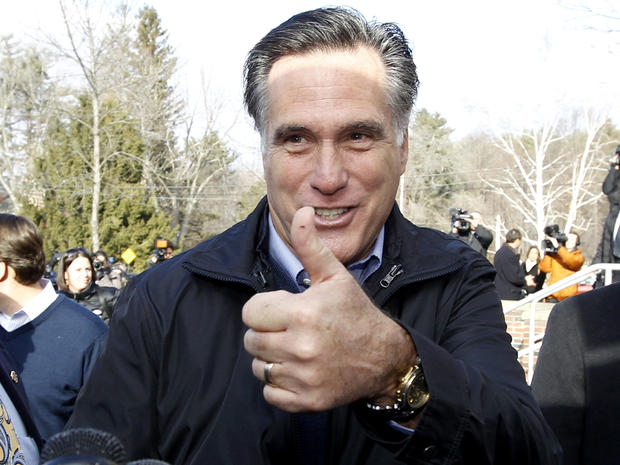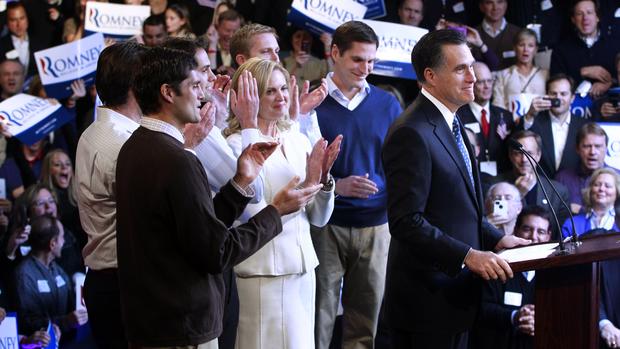Romney takes New Hampshire primary; Paul comes in second
Updated 12:23 a.m. ET
Former Massachusetts Gov. Mitt Romney won the New Hampshire primary on Tuesday, overcoming harsh attacks from his rivals to complete an unprecedented sweep of the first two states on the GOP nominating calendar.
Second place went to Texas Rep. Ron Paul. Former Utah Gov. Jon Huntsman, who essentially staked his entire campaign on a strong showing in the Granite State, came in third.
Republican Primary Election Center
Romney's win in New Hampshire, coupled with his victory in the very different state of Iowa, cements his status as the clear frontrunner for the GOP presidential nomination - albeit one about whom many Republicans have yet to embrace, as evidenced by national polls showing him unable to win more than 30 percent support.
"Thank you, New Hampshire," Romney said Tuesday evening. "Tonight we made history!" (Watch his remarks at left.)
Looking ahead to the general election, Romney then pivoted to a criticism of "the failed leadership" of President Obama, who won the Democratic primary in New Hampshire Tuesday in the absence of serious opposition. Romney did not name any of his GOP rivals in his victory remarks.
With 284 of 301 precincts reporting, Romney had 40 percent of the vote, or 95,666 votes, followed by Paul with 23 percent and Huntsman with 17 percent. They were followed by former House Speaker Newt Gingrich with 10 percent, former Pennsylvania Sen. Rick Santorum with 9 percent and Texas Gov. Rick Perry with 1 percent.
Only 12 delegates were at stake in New Hampshire -- 1,144 are needed to win the nomination -- but its status as the first-in-the-nation primary gives the state outsize importance in the nominating process. Candidates that exceed expectations often receive a boost in fundraising and momentum, while those that come in below expectations can take a hit that can drive them out of the race.
Full New Hampshire primary results
For Huntsman, who saw his poll numbers inch up ahead of primary day, the third-place finish is something of a disappointment. The former Utah governor and U.S. ambassador to China under Mr. Obama, who has a reputation as a moderate thanks to his positions on issues like climate change and illegal immigration, skipped the Iowa caucuses to focus
almost exclusively on New Hampshire.
As the
results were becoming clear Tuesday evening, Huntsman vowed to stay in the race. He was upbeat in remarks Tuesday night, stressing to supporters the importance of "putting this country first." Huntsman has portrayed Romney as putting his personal ambition ahead of the needs of the nation.
"Ladies and gentlemen, I think we're in the hunt," Huntsman told cheering supporters. "I'd say third place is a ticket to ride." (Watch his remarks at left.)
Jon Huntsman to continue campaign, says he's headed to South Carolina
Jon Huntsman survives, but for how much longer?
For Paul, meanwhile, a second-place finish is a victory - but unlike for Huntsman, it was far from crucial. That's because Paul's antiwar, free-market philosophy has attracted a passionate base of supporters who are poised to stick with him - and continue to offer financial support - as he attempts to build up delegates over the long haul.
Paul's second-place finish was driven by independents and young voters, and exit polls showed he was the top choice of voters under the age of 40. In his remarks Tuesday, Paul said his finish was a victory for "the cause of liberty." (Watch his remarks at left.)
Paul said he called Romney to congratulate him, telling his supporters that Romney "certainly had a clear cut victory, but we are nibbling at his heels." The Texas congressman's call for pull American troops out of foreign countries prompted chants of "bring them home" from his backers.
Ron Paul: We're "nibbling at" Romney's heels
The exit polls showed that 60 percent of New Hampshire voters who cited the economy as the most important consideration supported Romney. He also received the most support from voters for whom electability was the top concern, with 62 percent of those voters backing Romney.
The former Massachusetts governor fared well among conservatives, moderates and Tea Party supporters in New Hampshire, with Romney the favored candidate of all three groups. The exit polls showed Romney winning 39 percent of moderates, 42 percent of conservatives and 40 percent of Tea Party supporters.
Why Mitt Romney won the New Hampshire primary
While the GOP electorate in New Hampshire, which allows independents to vote in the GOP primary, is more moderate than the GOP electorate in Iowa, 53 percent of New Hampshire voters identified as conservative, and 51 percent said they support the Tea Party.
More than one third of New Hampshire Republican primary voters in New Hampshire called themselves moderates, compared to just 15 percent in the Iowa caucuses. Twenty-one percent identified as white evangelicals, compared to 56 percent in the caucuses.
Independents made up 47 percent of the New Hampshire GOP primary electorate on Tuesday. They were divided between three candidates: Paul, who got 32 percent of their support, Romney, who got 29 percent, and Huntsman, who got 23 percent.
Romney was the top choice among both men and women, and he dominated among voters making more than $100,000 per year, winning nearly half of their support.
Romney, who hails from nearby Massachusetts and has a summer home in New Hampshire, was heavily favored to win the state. He entered Tuesday's primary day polling about 20 points ahead of his nearest rivals.
Had Romney fallen far short of expectations - say, by winning the state, but only with a single-digit margin - his finish would have be seen as less than a triumph. Yet the former governor appears poised to win the state comfortably. Romney entered primary day having endured some of the roughest days of his campaign, with his rivals aggressively attacking him over his record at venture capital company Bain Capital.
Gingrich, Perry and others characterized Romney as a ruthless corporate raider, the leader of a group of "vultures" who were unconcerned with the layoffs they sometimes instituted after taking over a struggling company. Romney also made a pair of gaffes in recent days that fed into his rivals' portrayal of him, including his comment that he "like[s] being able to fire people" during remarks about the importance of being able to choose between health care providers.
In his victory remarks Tuesday evening, Romney criticized his GOP rivals -- though not by name -- for their attacks on his business record.
"President Obama wants to put free enterprise on trial. In the last few days, we have seen some desperate Republicans join forces with him. This is such a mistake for our Party and for our nation. This country already has a leader who divides us with the bitter politics of envy. We must offer an alternative vision. I stand ready to lead us down a different path, where we are lifted up by our desire to succeed, not dragged down by a resentment of success.
Gingrich, who initially vowed to run a positive campaign, turned nasty toward Romney in the wake of the decision by Romney's allies to run attack ads that helped torpedo Gingrich's chances in Iowa. Gingrich's supporters are planning to run millions of dollars to attack Romney in South Carolina, which holds its primary on January 21.
Gingrich vowed to stay in the race Tuesday, telling supporters, "This is step two of a long process." (Watch his remarks at left.)
In a speech peppered with references to former President Ronald Reagan, the former House speaker said he is offering Americans the option of "very dramatic, very fundamental change."
Gingrich, Perry and Santorum are poised to battle for the hearts of religious conservatives in the socially-conservative Palmetto State. The decision by all three to stay in the race raises the prospect of a split in the conservative vote there that would allow Romney to win yet another early state -- and in doing so, effectively wrap up the nomination far earlier than most anyone expected. It's a scenario that has prominent conservatives scrambling to find some way coalesce around a Romney alternative, though it remains unclear who that alternative might be. Many on the right distrust Romney thanks to his moderate record as governor, which includes signing a universal health care law similar to the "Obamacare" health care law reviled by conservatives.
After a New Hampshire win, Romney braces for a fight in South Carolina
Perry, the onetime frontrunner in the race who faded in the polls despite outspending most of his rivals, downplayed his poor showing in New Hampshire. Perry did not campaign in New Hampshire, opting instead to focus on South Carolina.
"Tonight's results in New Hampshire show the race for 'conservative alternative' to Mitt Romney remains wide open," he said.
Santorum, meanwhile, told supporters Tuesday night that he was offering a "message for America," casting himself as a "messenger that can deliver what we need - which is first and foremost to defeat Barack Obama." (Watch his remarks at left.)



